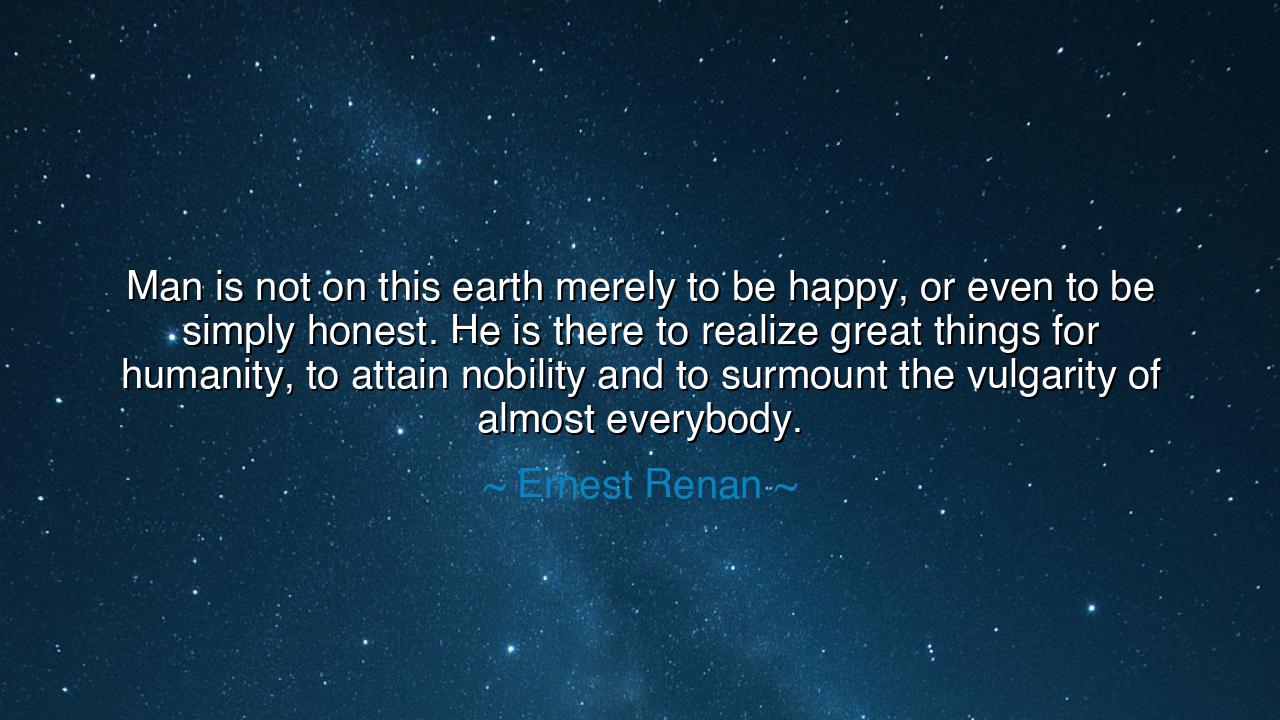
Man is not on this earth merely to be happy, or even to be simply
Man is not on this earth merely to be happy, or even to be simply honest. He is there to realize great things for humanity, to attain nobility and to surmount the vulgarity of almost everybody.






“Man is not on this earth merely to be happy, or even to be simply honest. He is there to realize great things for humanity, to attain nobility and to surmount the vulgarity of almost everybody.” Thus spoke Ernest Renan, the philosopher of spirit and intellect, whose voice rose in an age torn between faith and reason. In these words, he calls to the deeper nature of mankind — the part that refuses to be satisfied with comfort or mediocrity. Renan’s vision pierces the veil of ordinary existence to remind us that the true purpose of life is not mere happiness, nor the cold virtue of honesty, but the pursuit of greatness — a greatness not for oneself, but for humanity.
Renan lived in the nineteenth century, a time when Europe stood at the crossroads of science and belief, progress and moral decay. He saw men chasing pleasure as if it were purpose, and others clinging to empty virtue without vision. Against this backdrop, he wrote these words to awaken the sleeping soul — to proclaim that man was not born for comfort, but for excellence, not to dwell in mediocrity, but to rise toward the divine heights of nobility. To Renan, the measure of a life was not how happily it was lived, but how greatly it was given. For to live only for oneself, even honestly, is to live too small a life.
This teaching, though ancient in spirit, echoes through all ages. The wise have always known that happiness, though sweet, is a fleeting guest, while greatness endures beyond the grave. The ancients spoke of the soul’s duty to strive upward — to conquer not nations, but the self; not to serve pleasure, but to serve virtue and truth. Renan’s “vulgarity of almost everybody” is not an insult to the common man, but a warning against the complacency that chains the soul to mediocrity. Most people, he observed, live not by conviction, but by habit — content to drift with the current of the age, never daring to rise above it. The noble soul, by contrast, swims against that current; he suffers more, perhaps, but he leaves a wake that guides others toward the light.
Consider the life of Florence Nightingale, the Lady with the Lamp, who walked through the filth of war to bring healing where there was despair. She did not seek happiness, nor applause, nor ease. Her life was one of labor, sacrifice, and sleepless nights — yet through her work, she redefined the meaning of compassion and the dignity of nursing. In her, Renan’s vision is made flesh: a being who lived not for comfort, but for humanity, who rose above the vulgar indifference of her time to create something noble and eternal. True greatness, as she proved, is born not from privilege, but from purpose.
Renan’s words also carry a subtle challenge — that the path to nobility is not one of mere morality, but of transformation. To be “simply honest,” as he says, is not enough, for honesty without courage can become passivity. One must act, create, and aspire. The noble life is a flame that burns away triviality, a force that uplifts not only oneself but others. It is the life of the artist who paints for truth, the scholar who seeks knowledge for enlightenment, the reformer who stands alone against injustice. Each, in his own way, surmounts the vulgarity of the world — the cynicism, the selfishness, the smallness — and reaches for something divine.
And yet, this greatness does not demand perfection, but persistence. It is not reserved for the chosen few, but for all who dare to rise above ease and seek meaning. Renan reminds us that every man and woman holds within themselves a spark of the eternal — the power to realize great things, to create beauty, to heal, to teach, to build. The question is not whether we can achieve greatness, but whether we will choose to pursue it. For those who do, life ceases to be a pursuit of happiness and becomes a vocation of purpose.
So, my children, hear this truth: you are not born merely to enjoy life, but to ennoble it. Seek happiness, yes, but not at the expense of greatness. Let your joy be found not in ease, but in creation; not in comfort, but in contribution. Stand apart from the vulgarity of indifference — from the crowds that chase pleasure without purpose. Instead, lift your gaze toward what is timeless. Strive to leave the world more luminous than you found it.
For as Renan teaches, man’s highest calling is not to be content, but to be noble — to live as if every act were a prayer, every effort a gift to the generations to come. When you rise each day, ask not, “How may I be happy?” but “What greatness may I serve?” For happiness fades with the setting sun, but nobility endures like the stars — shining through the ages, a testament to those who dared to rise above the vulgar, and became instead the architects of the human soul.






AAdministratorAdministrator
Welcome, honored guests. Please leave a comment, we will respond soon